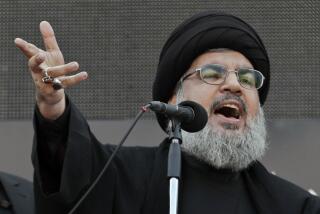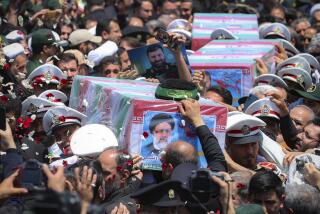Lebanese ayatollah offers advice for ‘modern Shiites’
BEIRUT — The ayatollah has a simple piece of advice for any Muslim woman being abused by her husband: Hit him back.
“A woman can respond to physical violence inflicted on her by a man with counter- violence as a self-defense measure,” Grand Ayatollah Mohammed Hussein Fadlallah, Lebanon’s senior-most Shiite cleric, wrote in a fatwa late last year that shocked conservative Muslims around the world.
Fadlallah long has been considered a leader of the most radical faction of Shiite Muslims in Lebanon. He endorsed Ayatollah Ruhollah Khomeini’s Islamic Revolution in Iran and was accused of ordering, or at least encouraging, the 1983 bombings of the U.S. Marine barracks here, a charge he and his supporters have denied. He issued fatwas, or religious edicts, calling on the faithful to resist the United States, and urged Muslims to boycott American products.
But the 72-year-old cleric, who agreed to an interview recently in his South Beirut compound, has toned down his rhetoric in recent years. Instead, he espouses a more modest vision for the faithful than the ambitious agenda set forth by Iran, which considers itself the patron of Shiites worldwide and has been trying to increase its influence throughout the Muslim world.
“I don’t see there is a unity in the situation of Shiites in the world,” he said.
He leaned forward, his piercing brown eyes becoming animated as he discussed religion, politics and international affairs. “I think the current Iranian president lacks diplomatic skills, and I think he creates problems for Iran,” he said of Mahmoud Ahmadinejad.
Fadlallah, whose black turban identifies him as a descendant of the prophet Muhammad, focuses on daily bread-and-butter issues of concern to his followers. Such as parenting.
“One of the general principles in raising children is that parents should not consider their child as part of their possessions,” he wrote in a ruling translated and placed on the English section of his website, english.bayynat.org.lb. “Instead, they should consider him God’s trust that Allah . . . has put in their hands. This is done by loving the child, listening to him and respecting his mind.”
Grand ayatollahs, the highest-ranked clerics in the Shiite hierarchy, have the right to interpret primary religious texts and serve as marja, or source of emulation, for their millions of followers in countries with large Shiite populations such as Lebanon, Iraq, Iran, Pakistan, India and Bahrain. Most search for a niche. Khomeini espoused a highly politicized version of Islam; Grand Ayatollah Ali Sistani in Iraq advocates piety, modesty and good deeds.
Fadlallah’s fatwas and statements seem more like daytime talk show fodder.
“Sistani is very popular in the Shiite world, but he’s not involved in the daily lives of Shiites,” said Fadlallah’s aide, Hani Abdullah. “This is why Fadlallah is more of a reference for modern Shiites.”
On gender issues in particular, he takes positions that raise eyebrows among his conservative counterparts, such as questioning the conventional Islamic prohibition on female judges and challenging the traditional view that a woman’s place is in the house and the man’s in the workplace.
“The belief that it is disgraceful for the man to manage household tasks is derived from the social culture and not from Islam,” he says in a statement on his website. “Personally, I think that no woman would be obliged to bring her social life to a standstill just because she is being occupied with her children.”
Also from his website: “Knowledge is a merit for man and woman equally, and the importance of acquiring it is identical to both of them.”
A statement from Fadlallah’s office said he opposed a man “using any sort of violence against a woman, even in the form of insults and harsh words.”
He also has addressed issues such as cloning and plastic surgery.
“Mostly his fatwas are on the side of modernity and progress,” said Fawwaz Traboulsi, a Lebanese historian and journalist. “He’s very influential, and he’s got a lot of money.”
His most liberal rulings and attempts to distance Lebanese Shiites from Iran’s policies have angered some Shiite clerics close to the Islamic militant group Hezbollah and its leader, Sheik Hassan Nasrallah. Fadlallah was once Hezbollah’s spiritual leader, but now the two camps compete for donations from wealthy Shiites, who traditionally have given more money to him.
“There’s a real rivalry with Nasrallah, who has become both a military and religious leader,” Traboulsi said. “Many conservative Hezbollah clerics are reacting against Fadlallah’s rulings.”
Fadlallah appears to have eased his anti-American stances, even though he and others suspect U.S. operatives were behind an attempt on his life in 1985, apparently as retaliation in the belief that he had ordered the Marine barracks attack. The massive car bomb near his home killed more than 80 people in an apartment block, but he was unhurt.
He is critical of the Bush administration but takes pains to underscore that he’s not anti-American. He recently answered a question about astronomy and Ramadan posed by a U.S. Marine, a decision criticized by other clerics. He was among the first religious leaders in the Middle East to condemn the Sept. 11 attacks.
But Fadlallah remains a staunch critic of Israel, once describing the Jewish state as “a conglomerate of people who come from all parts of the world to live in Palestine on the ruins of another people.”
More to Read
Sign up for Essential California
The most important California stories and recommendations in your inbox every morning.
You may occasionally receive promotional content from the Los Angeles Times.










